Food and Environment 2011
First International Conference on Food and Environment - The Quest for a Sustainable Future
21 - 23 June 2011
New Forest, UK
Introduction
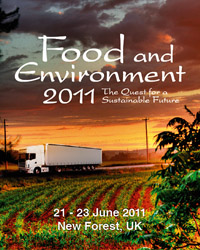 The 1st International Conference on Food and Environment recently took place in the New Forest, UK, organised by the Wessex Institute of Technology (WIT). The Co-Chairmen were Professor Viktor Popov and Professor Carlos A Brebbia, both from WIT.
The 1st International Conference on Food and Environment recently took place in the New Forest, UK, organised by the Wessex Institute of Technology (WIT). The Co-Chairmen were Professor Viktor Popov and Professor Carlos A Brebbia, both from WIT.
The conference focused on a variety of issues from production to transport and storage affecting the quality and safety of food products and at the retail shops. The aim of the conference was to emphasise the effects of modern food production processes on human health and the environment and to initiate discussion on the best ways to provide food of required quality, sufficient quantities and in sustainable way which takes into account the environment.
The many advances made over a century in food production have resulted in the possibility of feeding the whole of humanity at present. These advances have been achieved by the introduction of new production partners and a variety of added substances aimed to enhance the quality and safety of the food products; the whole process being affected by other environmental conditions such as contamination of air, water and soil resulting from sources other than agriculture. On the other hand there are examples where the food production and food processing have detrimental effects on the environment. Some of the major challenges remain with extensive farming, which though offering higher productivity and larger volumes should not either compromise the quality of the product or cause suffering to animals.
Given the importance of this problem which affects the whole world population, it is essential to understand the consequences that food production, processes and demands can have on the food consumed daily. Of particular importance are the effects on human health and the well-being of the population, as well as the more general issues related to possible damage to the environment and ecology.
Food related problems, in spite of their importance, have not been sufficiently well discussed in relation to the possible consequences to the environment to better understand the challenges faced by society in this regard.
Opening Addresses
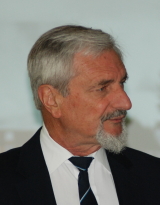
The conference books – Professor Brebbia explained - are widely distributed in paper and digital format, and all papers are permenantly archived online in the WIT eLibrary at http://library.witpress.com where they are available to the international community.
In addition, WIT Press publishes a substantial number of edited books and monographs which are disseminated throughout the world by large number of distributors and agents. WIT has also its own office in Boston (USA) to serve the important American Market. It has also launched four interdisciplinary international scientific Journals dedicated to opening new avenues for communication between different scientific disciplines.
Professor Brebbia also mentioned that the Institute’s work and reputation is based on the development of advanced computational methods, which are applied to solve a wide variety of problems. WIT, for instance, has participated in many EU projects, working with partners in disciplines such as medicine, food science, aerospace, offshore structures and many others. The expertise of WIT is by definition of an interdisciplinary character as modelling techniques can be applied to solve many types of problems.
The interest of the Wessex Institute – Professor Brebbia explained – is not to grow in number of researchers but concentrate of high quality work. The facilities at the Ashurst Lodge campus are constantly being upgraded to achieve a better research environment. The aim of the Institute – Professor Brebbia said - is to continue collaborating with many Institutions around the world.
A series of informal links and collaborative programmes are witness to the commitment of WIT to ecological and environmental issues. This includes the award of the Prigogine Medal, instituted in collaboration with the University of Siena to honour the memory of the Nobel Prize winner, whose work has influenced all disciplines. The Medal was established in 2003 upon the death of Prigogine, who acted as an Honorary Chairman for one of the WIT conferences, and since then it has been awarded annually to a renown scientist whose research has been influenced by Prigogine’s ideas.
Professor Brebbia concluded his address by welcoming the delegates to the conference and wishing them a successful meeting. WIT – he said - is open to collaborating in many different ways, including publications, courses and conferences, as well as research and industrial applications.
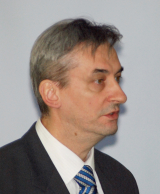
Following Professor Brebbia's remarks, Professor Viktor Popov explained the work of his Division relating to the topic of the conference, much of which has been carried out through participation in different EU projects.
The Food and Environment conference created an atmosphere which encouraged fruitful interactions and exchange of knowledge and ideas amongst the participants. The delegates took part in a series of social activities, including coffee breaks, lunches, a barbeque at the WIT campus, the conference dinner and a special excursion. These events helped to cement the links amongst the delegates and led to many productive informal discussions.
Conference Topics
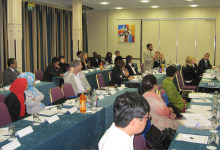 The papers presented at the conference were published in a special volume of WIT Transactions in Ecology and the Environment. They were divided into the following topics;
The papers presented at the conference were published in a special volume of WIT Transactions in Ecology and the Environment. They were divided into the following topics;
- Impact of food production on the environment
- Contamination of food
- Food processing issues
- Traceability and temperature control
- Characterization of food plants
Keynote Addresses
There were a series of keynote addresses;
‘Comparison of argon and nitrogen containing atmospheres on quality parameters and shelf life of fresh meat’
by U List, University of Bonn, Germany
‘Microbial growth models for shelf life prediction in an Icelandic cod supply chain’
by V Popov, Wessex Institute of Technology, UK
‘Environmental impacts of local food production in Japan and changes needed for future sustainability’
by S Mishima, National Institute for Agro-Environmental Science, Japan
‘Novel solutions supporting inter-organisational quality and information management’
by V Raab, University of Bonn, Germany
‘Multicriteria model for the selection of traceability and temperature control technologies along the cold chain’
by A Galle Domingo, ITENE, Spain
Social Events and Excursions
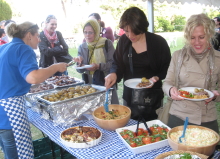 A lamb barbeque was organised at the end of the first day at Ashurst Lodge so that the delegates could visit the Wessex Institute campus and relax in a pleasant environment. The barbeque was a great success (Hampshire lamb is well-known for its excellent quality). At the end of the meal, the delegates were divided into small groups and taken on a tour of the campus by several members of the staff. The event helped to strengthen links between the participants and open areas of future collaboration with WIT.
A lamb barbeque was organised at the end of the first day at Ashurst Lodge so that the delegates could visit the Wessex Institute campus and relax in a pleasant environment. The barbeque was a great success (Hampshire lamb is well-known for its excellent quality). At the end of the meal, the delegates were divided into small groups and taken on a tour of the campus by several members of the staff. The event helped to strengthen links between the participants and open areas of future collaboration with WIT.
A further event took place during the conference, consisting of an excursion to Winchester, an old Roman city which was once capital of England. There are many interesting buildings and museums in Winchester but the most important site is the Cathedral, built in the Norman style of the 11th century. It is one of the most famous buildings in England, with rich traditions, numerous memorials and where many historical events took place. The delegates were offered a guided tour of the Cathedral, describing the many works of art, including those in the Crypt.
After the tour, they were taken to visit the city centre and explore some of the many attractions that the city has to offer.
The participants were also offered a complimentary copy of the book ‘Winchester, An Architects’ View’ by Peter Kilby, published by WIT Press. The book describes the social and architectural history of Winchester from its earliest beginnings to the present day. It presents an up-to-date picture of the city’s architecture, cityscape and landscape set against the influences of its long history. The book includes numerous illustrations (ISBN: 1-85312-548-9).
Conference Dinner
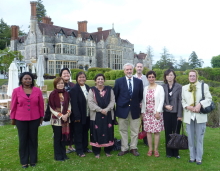 The conference dinner took place in Rhinefield House, a most impressive Manor House, originally one of the Forest Keeper’s residences and now an excellent hotel. The current house was built at the end of the 19th century on the site of an old New Forest Lodge. It was the residence of the Munro-Walker family, whose fortune was based in coal mining, in Nottingham (They were the owners of many workers cottages, one of which was the birthplace of the author DH Lawrence).
The conference dinner took place in Rhinefield House, a most impressive Manor House, originally one of the Forest Keeper’s residences and now an excellent hotel. The current house was built at the end of the 19th century on the site of an old New Forest Lodge. It was the residence of the Munro-Walker family, whose fortune was based in coal mining, in Nottingham (They were the owners of many workers cottages, one of which was the birthplace of the author DH Lawrence).
The house has an eclectic architecture, externally broadly resembling a Scottish Castle, and is set in beautiful grounds. It contains a number of reception rooms and dining rooms decorated in different styles, including the large Main Hall, whose roof was modelled on the hammer and beam structure of the ancient Westminster Hall in the Houses of Parliament. Other rooms are decorated in Italian and French styles, with a small one in Mudejar (i.e. Spanish Arabic) architectural type.
The delegates also had occasion to see the exceptional gardens, which are now being restored to the original state after many years of neglect.
The excellent dinner, accompanied by good wines, was enjoyed by all. At the end of this, Professor Brebbia thanked them for attending and presented each with a copy of his book ‘The New Forest’ (ISBN: 978-1-84564-145-0) and a piece of pottery specially commissioned for the occasion. The potter, a local artist, is renown for the quality of his pieces.
The success of the conference will ensure that it is reconvened at a time and location to be decided shortly.
Publication of Papers
The proceedings of Food and Environment, 256pp (Print ISBN: 978-1-84564-554-0; Online ISSN: 1746-448X) are available in paper and digital format from WIT Press priced at £110/US$220/€154. Orders can be placed on the WIT Press website at www.witpress.com or by email:
Papers from the conference will also be hosted online in the WIT eLibrary as Volume 152 of WIT Transactions on Ecology and the Environment (Online ISSN: 1746-448X). For more details visit the WIT eLibrary at http://library.witpress.com

 Wessex Institute
Wessex Institute